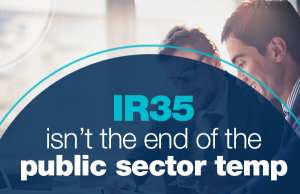In April 2021, Her Majesty’s Revenue and Customs (HRCM) introduced changes to the IR35 legislation which pertains to certain contingent workers in the UK. Although the legislation itself is by no means new, the updated version affects both organisations that employ contingent workers and these workers themselves. Now, organisations need to adapt to the new rules that are being imposed. Keep on reading to find out more about IR35, as well as what the new rules include and what implications this change currently has in terms of the companies hiring contingent workers.
What are the new rules added to IR35?
Back in the year 2000, the intermediary legislation, also known as IR35, took effect in the UK. IR35 is a tax legislation designed to combat tax avoidance by “disguised employees”. The weak point of this old version of the intermediary legislation was that the workers were able to decide by themselves whether these rules apply to them. Many deemed themselves self-employed to circumvent the IR35 rules, as those don’t include self-employed individuals. The updated rules were implemented to solve this issue. Now the rules are clear-cut as to who falls under the IR35 legislation.
Who do the new IR35 rules involve?
Contingent workers, also referred to as off-payroll workers, are those individuals that aren’t officially employed in the company. They are hired on a project basis when their expertise is needed. There has been a growing trend to hire such workers, as it is more economically efficient than hiring more employees for full-time positions. They may work on-site or remotely. What separates these workers from regular employees is the fact that they don’t get paid holidays or other benefits, but are instead paid for the specific projects they finish. Not all contractors fall under the IR35 legislation, as is the case with self-employed individuals, also referred to as independent contractors. Some of the factors that may determine that someone is not an independent contractor, and therefore IR35 rules apply to them, include:
- the organisation that hired the worker is in charge of their workload,
- the contractor mainly conducts projects for one organisation,
- there is no significant financial risk for the contractor.
What action should the companies hiring off-payroll workers take?
Due to these changes which were added to the IR35 legislation, it’s imperative that organisations make sure that they are in compliance with the IR35 UK law. If they fail to do so, they may face penalties, or even be legally prosecuted. Here is a list of some of the things firms working with off-payroll workers need to do:
- do an assessment to work out which workers are inside IR35,
- calculate the amount to be paid in tax and health insurance,
- prepare a Status Determination Statement (SDS).
Since this is a complex matter, organisations may hire a company, such as CXC Global, which offers to aid organisations and ease the entire process. Their platform, CXC Comply, simplifies the process of making sure that all of the contractors are IR35 compliant, and enables speedy handling of the administrative side.
Who is responsible for determining the worker’s employment status and paying tax?
The answer to the question of who is responsible for working out the employment status of the contractor depends on whether the organisation belongs to the public or private sector. In terms of the public sector, the responsibility of working out the employment status of each contractor falls on the organisation that hired them. The company is obligated to inform them of the decision regarding whether they are inside or outside of IR35. In the case of the former, the organisation must deduce the income tax, as well as health insurance contribution, from the fee that they are paying the contingent worker for their services. This rule applies to all medium and large companies, while small ones are exempt from it. On the other hand, in the private sector, it is the worker who bears the responsibility of paying for tax, but the organisation needs to make sure that they are doing so.
In conclusion, in order to hire off-pay workers in accordance with the law, organisations need to be up-to-date with the IR35 rules. Essentially, the new rules added in 2021 state that off-payroll workers who don’t meet the criteria to be considered independent contractors fall under the intermediary legislation. It’s up to the companies hiring these workers to ensure they are IR35 compliant. Keep in mind that the rules slightly differ depending on whether the organisation belongs to the public or private sector.

